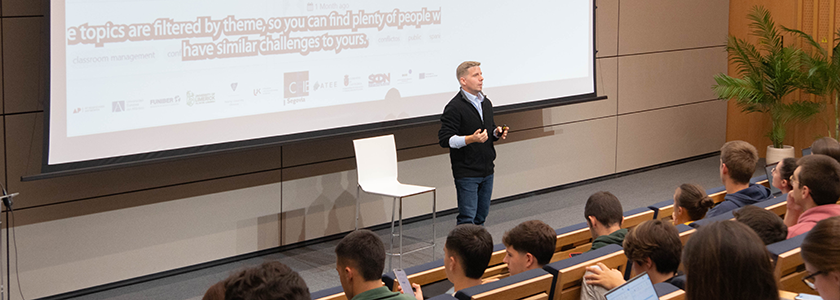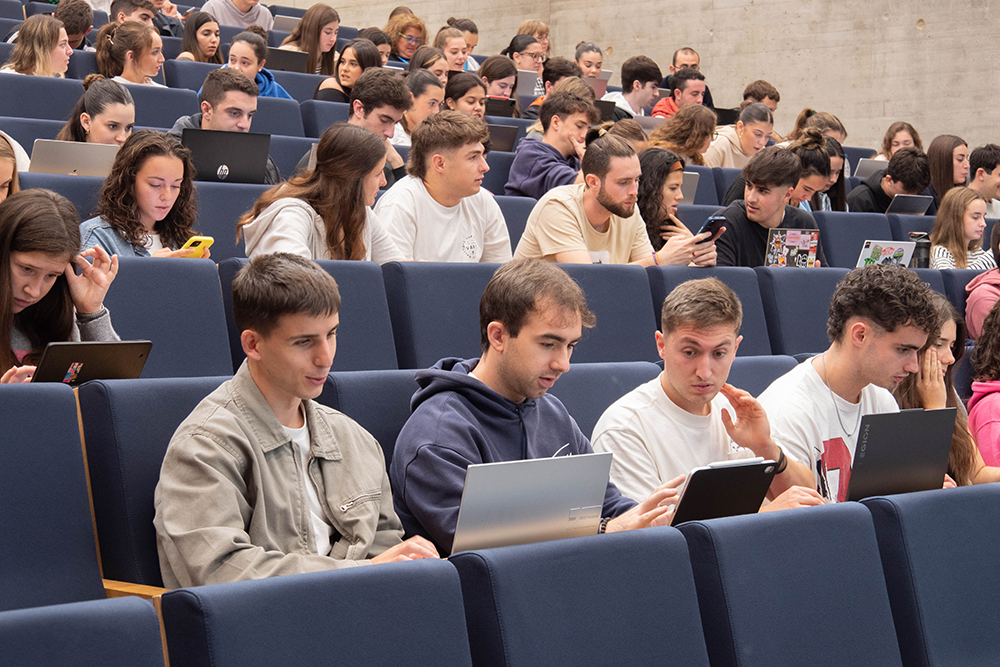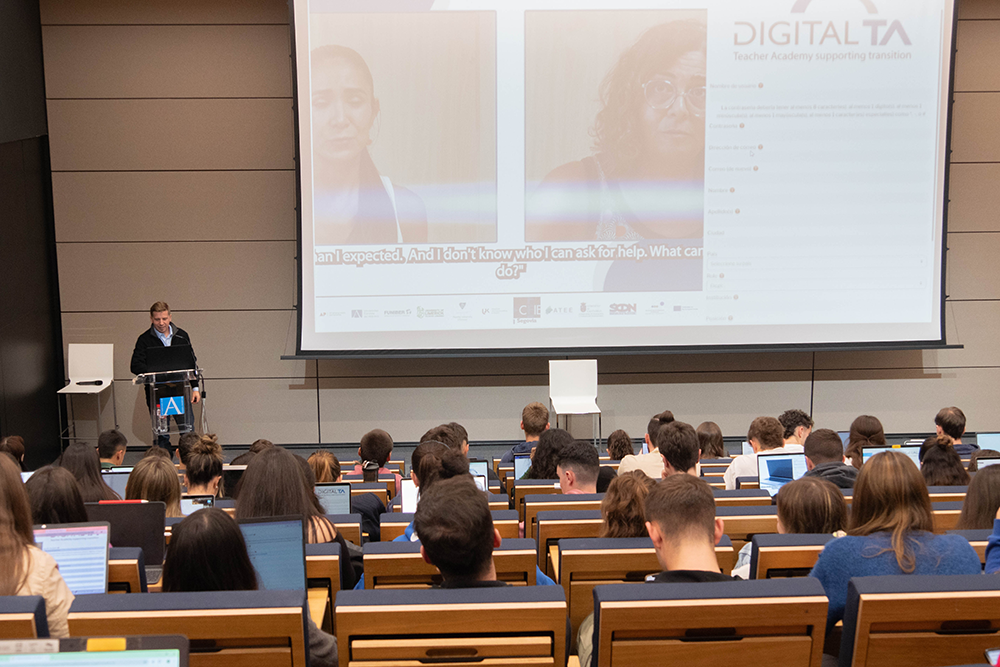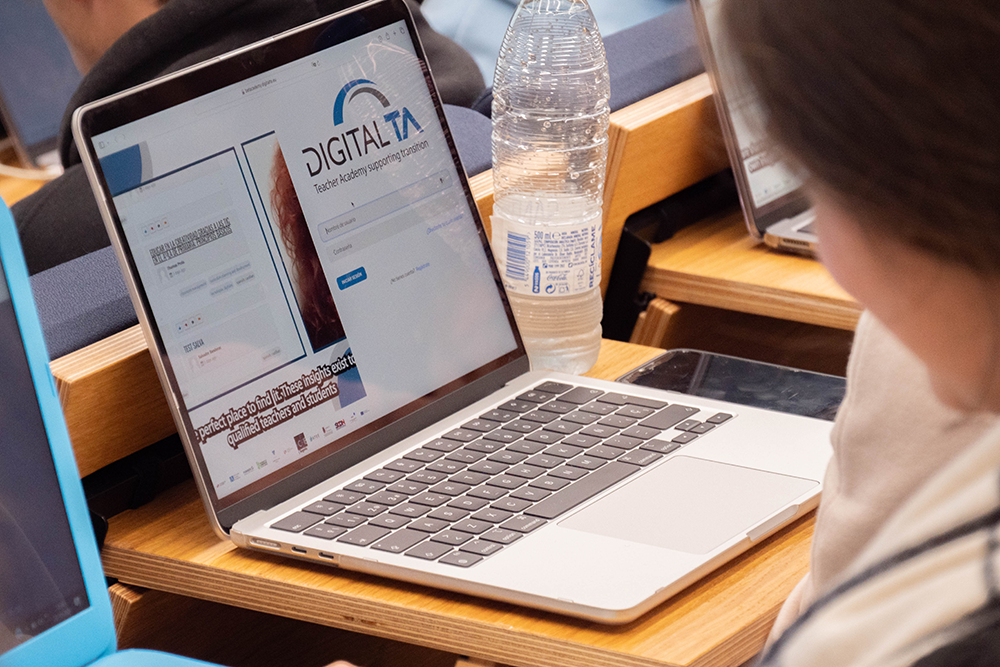More than a hundred students of the Degree in Primary Education and the Master’s Degree in Teacher Training of Compulsory Secondary Education and Baccalaureate, Vocational Training and Language Teaching of the European University of the Atlantic (UNEATLANTICO), accompanied by several of their teachers, attended last October 22 in the auditorium of the university to the presentation of a digital platform that aims to support the educational community in their transition process to the teaching profession.
The digital platform is mainly aimed at active and trainee teachers and is part of the Erasmus+ DigitalTA (2022-2025) project, led by the European University of the Atlantic (UNEATLANTICO) and in which the Iberoamerican University Foundation (FUNIBER) also participates, together with several European institutions.
After a brief presentation of the activity by Josep Alemany, director of the Degree in Primary Education and the Master’s Degree in Teacher Training for Compulsory Secondary Education, Vocational Training and Language Teaching and project coordinator, Dr. Thomas Prola, professor at UNEATLANTICO and co-coordinator of the project, presented the platform to the attendees, showing them the different sections that comprise it.
During the month of November, the first part of the pilot test will begin, with tutors and students from FUNIBER’s university network. Students will be able to carry out certain actions within the platform: read international experiences, share an experience with the learning community, develop a case study, search for resources to reflect on their own practice, among others. On the other hand, tutors will be able to share an experience, develop a case study, offer individual tutoring, etc. Finally, all of them will have to fill in the platform’s satisfaction questionnaire in order to propose improvements to the partners.
How does this platform work?
The platform offers five modules:
- My experience: It is a space to discuss problems and solutions in the classroom, ask for advice and receive support.
- Reflection management: In this section, teachers and trainee teachers will carry out a self-reflection on their teaching practices.
- My Tutoring: Users can ask for help and guidance from experienced professionals at different educational levels, both individually and in groups.
- Case studies: this section contains a database of case studies for analysis and strategy development.
- Resource repository: This module draws on user experiences and integrates a collection of filterable educational materials to improve teaching practice.
To help users navigate and connect with relevant topics and discussions, content is organized into specific themes: digital technology; classroom management; school culture; curriculum, planning and development; communication and relationship building; collaboration and professional development; diversity and inclusion.
What is the origin of the project?
The project emerges from a review of studies showing that one of the problems of teachers is located in the transition period from initial training to the first years of their professional practice in the classroom. A period in which this group experiences a transition from “learning to teach to teaching to teaching to learn”.
During the course of the project, a study of the needs of novice teachers and possible supports for providing answers was carried out, in which 160 novice teachers participated.
Among the results of the questionnaire, it was noted that teachers are motivated by the feeling that they can positively influence the younger generation: they see it as an opportunity to work with children and maintain their “faith” in the value of teaching. It was also found that less experienced teachers positively value the support of mentor figures, peers and school leaders, but that they often feel isolated and need more help and guidance. Therefore, good social relationships with their peers play an important role in their learning progress. In addition, the lack of work-life balance is another problem highlighted in the results.
The main training needs identified are: classroom management, individual teaching support (diversity and inclusion), soft skills (communication, time and stress management), digital technologies, professional collaboration, understanding school culture, curriculum and planning support.
Also participating in the project are: AP University of Applied Sciences and Arts Antwerp (AP) from Belgium; Uniwersytet Jana Kochanowskiego w Kielcach (UJK) and Swiętokrzyskie Centrum Doskonalenia Nauczycieli (ŚCDN) from Poland, as well as the Centro de Formación del Profesorado de Segovia (CFIE) and the Iberoamerican University Foundation (FUNIBER) from Spain.
Those interested in the DigitalTA project can obtain more information through its website.

“Funded by the European Union. However, the views and opinions expressed are solely those of the author(s) and do not necessarily reflect those of the European Union or the European Educational and Cultural Executive Agency (EACEA). Neither the European Union nor the granting authority can be held responsible for them.”



